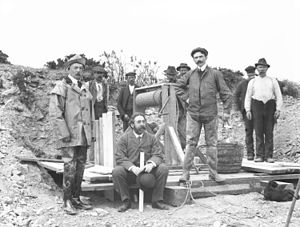County Waterford
| County Waterford Irish: Contae Phort Láirge Republic of Ireland | |

| |
|---|---|
| [Interactive map] | |
| Province: | Munster |
| Area: | 717 square miles |
| Population: | 113,795 |
| County seat: | Waterford |
The County of Waterford is a shire in the province of Munster on the south coast of Ireland. It is named after the city of Waterford which is derived from the Old Norse name Veðrafjǫrðr or Vedrarfjord. The population of the county is 113,795 according to the 2011 census.
Geography
County Waterford has two mountain ranges, the Knockmealdown Mountains and the Comeragh Mountains. The highest point in the county is Knockmealdown, at 2,605ft. It also has many rivers, including Ireland's third longest river, the River Suir (115 miles); and Ireland's fourth longest river, the Munster Blackwater (105 miles). There are over 30 beaches along Waterford's volcanic coast line. A large stretch of this coastline, known as the Copper Coast has been designated as a UNESCO Geopark, a place of great geological importance.
Baronies
There are eight historic baronies in the county: Coshmore and Coshbride, Decies-within-Drum, Decies-without-Drum, Gaultiere, Glenahiry, Middle Third, Upperthird and Waterford City.
Towns and villages
- Abbeyside, Affane, Aglish, Annestown, An Rinn, Ardmore
- Ballinacourty, Ballinameela, Ballinamult, Ballinroad, Ballybeg, Ballybricken, Ballyduff Lower, Ballyduff Upper, Ballydurn, Ballygunner, Ballylaneen, Ballymacarbry, Ballymacart, Ballynaneashagh, Ballysaggart, Ballytruckle, Bilberry, Bunmahon, Butlerstown
- Cappoquin, Carrickbeg, Carriglea, Cheekpoint, Clashmore, Clonea-Power, Clonea Strand, Colligan, Coolnasmear, Crooke
- Dungarvan, Dunhill, Dunmore East
- Dunhill
- Faha, Faithlegg, Fenor, Ferrybank, Fews, Fourmilewater
- Glencairn, Grange
- Helvick Head
- Kilbrien, Kilgobinet, Kill, Killea, Kilmacthomas, Kilmanahan, Kilmeaden, Kilrossanty, Kilwatermoy, Kinsalebeg, Knockanore
- Lemybrien, Lisduggan, Lismore
- Mahon Bridge, Mine Head, Modeligo, Mothel, Mount Congreve, Mount Mellaray
- Newtown
- Old Parish
- Passage East, Portlaw
- Rathgormack
- Sliabh gCua, Stradbally
- Tallow, Tramore, Touraneena, Tourin, Tycor
- Waterford, Whitechurch, Whiting Bay, Woodstown
- Villierstown
History

County Waterford is colloquially known as "The Déise", pronounced "day-sha" (Irish: An Déise). Some time between the 4th and 8th centuries, a tribe of native Gaelic people called the Déisi were driven from southern county Meath/north Kildare]], conquering and settling here. The ancient principality of the Déise is today roughly coterminous with the current Roman Catholic Diocese of Waterford and Lismore. The westernmost of the baronies are "Decies within Drum" and "Decies without Drum", separated by the Drum-Fineen hills.[1] There are many megalithic tombs and ogham stones[2] in the county. The Viking influence can still be seen with Reginald's Tower, one of the first buildings to use a bricks and mortar construction method in Ireland. Woodstown, a settlement dating to the 9th Century was discovered 3½ miles west of Waterford city. It was the largest settlement outside of Scandinavia and the only large-scale 9th Century Viking settlement discovered to date in Western Europe. Other architectural features are products of the Anglo-Norman Invasion of Ireland and its effects.
References
- ↑ Egan, P.M. (20 November 2004) [1893]. "Early Waterford History 2. The Decies". History of Waterford. http://www.waterfordcountymuseum.org/exhibit/web?task=Display&art_id=184&pagenum=2. Retrieved 2008-02-23.
- ↑ "Prehistoric Waterford tombs, dolmens and standing stones". Prehistoricwaterford.com. http://www.prehistoricwaterford.com/sites-a-z/.
Outside links
| ("Wikimedia Commons" has material about Waterford County Waterford) |
- Waterford County Museum – 3500 pages of County Waterford history
- Waterford County Image Archive – Thousands of photos and images from County Waterford history
- WaterfordTourism.org – Official Waterford Tourism website
- The Diocese of Waterford and Lismore
- Work in Waterford- Provide assistance for people who wish to work in county Waterford.
- Invest in Waterford- an initiative by Waterford County Council to encourage industry to invest in County Waterford.
| Counties of the Republic of Ireland |
|---|
|
Carlow • Cavan • Clare • Cork • Donegal • Dublin • Galway • Kerry • Kildare • Kilkenny • Laois • Leitrim • Limerick • Longford • Louth • Mayo • Meath • Monaghan • Offaly • Roscommon • Sligo • Tipperary • Waterford • Westmeath • Wexford • Wicklow |
